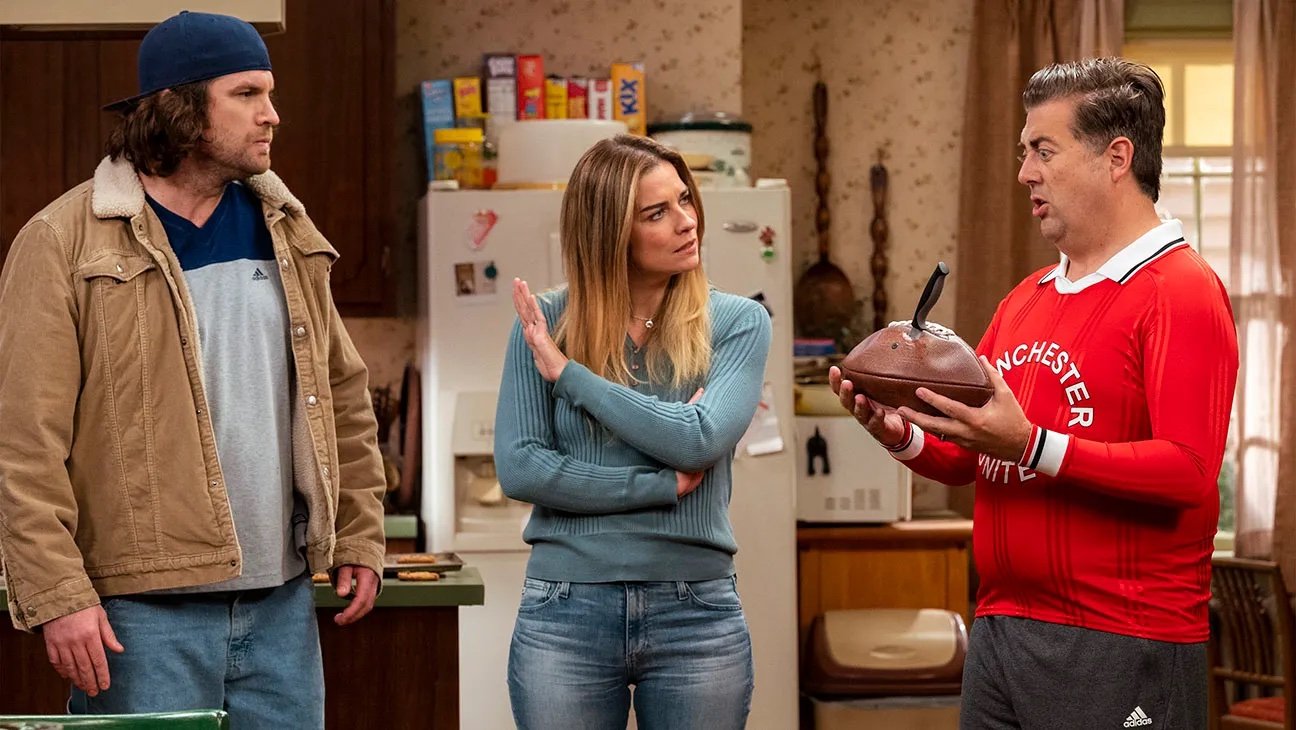Television Show: Kevin Can F**k Himself
Kevin Can F**k Himself - Photo by AMC Studios
Everyone loves a good parody. Bo Burnham and Weird Al coined that genre, and it skyrocketed. Exposing what’s really going on in people’s heads when watching something allows others to feel like they aren’t the only ones thinking this way. “Kevin Can F**k Himself” works that way too, uncovering what we’re really thinking when watching shows like Family Guy, King of Queens or Everybody Loves Raymond. These shows all run under the same formula of the dopey husband, Kevin, played by Eric Peterson, who is waited on by his naïve and understanding wife that puts up with his idiotic tendencies and borderline sexist remarks because the world revolves around him.
“Kevin Can F**k Himself” finally gives the mic to his wife, Allison, played by Annie Murphy, who isn’t as “naïve and understanding” as people think. Director Valerie Armstrong toys with the film styles by teetering between the laugh track sitcom that audiences are used to, but in Allison’s point of view uses a single camera drama filter to capture Allison’s true emotions. Thus creating a unique masterpiece that alludes to the true vision of an abusive relationship that is seen to the world as the “typical American marriage.”
Neil (Alex Bonifer), Allison (Annie Murphy), and Kevin (Eric Petersen) in Kevin Can F**k Himself - Photo by Jojo Whilden/AMC
The first episode starts off sitcom style in their home in Worchester, Massachusetts. Kevin is throwing an “anniversary party” for his and Allison’s tenth anniversary, and Allison proposes they have a dinner instead. Kevin makes a remark about how “girl vs boy 35” is different; how he has hit his prime and Allison is well past hers. Once she leaves the room, the camera pans to Allison in the kitchen where the lights have shifted and there’s a ringing sound in the distance, as if her head is spinning and she smashes Kevin’s beer glass on the table. She yells, “I’m fine,” and the screen turns to black. Within the first scene, the audience sees through Allison’s eyes the turmoil behind her smile.
Throughout the episode, the audience sees Allison’s dreams of revision in her boring and aggravating life. She wants to move out, away from Kevin’s entourage and finally start being happy. Kevin becomes more pathetic after every scene, fully encapsulating the overdramatic manchild that ruins everything he touches, including his marriage. It’s not just Kevin that treats her less-than, it’s the entire town of Worchester. She has lived in the town her entire life and is seen as a low life who wasn’t successful enough to get herself out. At the end of the episode, Allison realizes that Kevin is never going to change and decides that she is going to kill him.
A misconception in this show is that the sitcom is supposed to be actually funny. The audience is supposed to roll their eyes and sigh at everything that comes out of Kevin’s mouth. The true brilliance is in the actors, in which all of them end up alternating between acting for a sitcom and acting for a drama, with flawless transitions between the two.
Kevin, his dad, and his buddy’s stories in each episode never add any plot to what is happening behind the scenes with Allison and Patty, who are caught in a wound of trouble as Allison plots Kevin’s murder. It brings light to such dark moments with Allison, in which you cannot help both feeling bad for Allison but also questioning her decisions. It is almost as if they are in on the switches between light and dark, almost as if they know how they need to act in order to keep the peace with Kevin.
Allison (Annie Murphy) in Kevin Can F**k Himself - Photo by Jojo Whilden/AMC
The real question is, why wouldn’t Allison divorce Kevin rather than killing him? Allison isn’t a perfect character, and throughout the show the audience sees her make more and more bad decisions that make her situation worse. While she may not be the most rational character, she thought through her insanity. Leaving Kevin was much harder for Allison than meets the eye. She met Kevin when she was young, after her father died, and her mother told her that college wasn’t for girls like her.
According to the people of Worchester, she was destined to never leave. A man like Kevin who was goofy but also interested in her gave her a purpose, even if it wasn’t to her upmost potential. After 10 years, everything that was hers was Kevin’s. Even the car was under Kevin’s name, and without their savings, she wouldn’t get anything. Kevin is also incredibly stubborn. She knew that Kevin would have put up a fight and refused to get a divorce, and unfortunately, what Kevin wants, Kevin usually gets. Allison’s desperation is what led her to what she thought was her only way out.
Some of the best moments come from Neil and Patty, who’s storylines are left unanswered. A lot of what lies behind their characters are left to the audience to piece together, but with so many pieces missing it is difficult to decipher. Patty is a part of the drama from the first episode, and it follows her romantic relationships and a questionable relationship with Allison. Neil’s story doesn’t begin until the second season, as he wounds up in a relationship with an unexpected character as he struggles with trauma and alcoholism. Some closure with these characters would have made this show even better.
Valerie Armstrong brings familiarity and shock together in this dark comedy, and it works. She brings a misunderstood character to life, uncovering the false premise that this is a woman’s fate, through silly one-liners and climactic nervous breakdowns.



